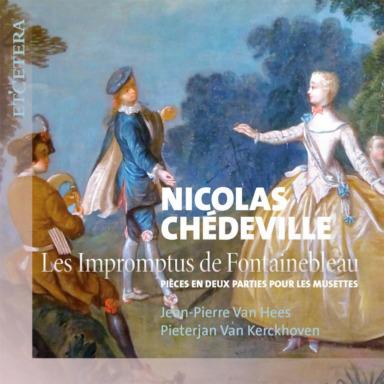The Bagpipe Society
CD Review - Jean-Pierre van Hees and Pieterjan van Kerckhoven - Les Impromptus de Fontainebleau

As Jean-Pierre van Hees complains in the notes to the CD, the musette has something of a reputation as a ’novelty’ instrument or even an aristocratic toy.
However, once you start looking at the musette’s repertoire you realise that there must have been some very capable players around the court of Louis XIV.
That included professional players and makers of the instrument, such as the Chédeville family (related to the Hotteterres). Nicolas Chédeville also composed for the instrument, notably stealing Vivaldi’s Four Seasons for the musette as Les Saisons Amusantes, having already published his own Il pastor fido sonatas under the name of the better known Venetian (and thereby creating a puzzle that lasted two centuries).
This is music for connoisseurs. It’s not going to come and grab you. This disc doesn’t have the variety you get with, for instance, a Blowzabella or La Machine album, or French baroque music played by Les Musiciens de Saint Julien or Arpeggiata. You get two musettes, and only two musettes. No sax or accordion; no recorder, bassoon, continuo, oboe; just the musettes. If you want contrasting arrangements and shifting dynamics to whet your appetite, that’s not what’s offered here.
Instead, van Hees and van Kerckhoven offer a nicely springy reading of the nearly 40 pieces in the Impromptus de Fontainebleau, from beginning to end.
I found it quite instructive to compare their version of Les Singes Verts with Duo Macke Bornauw’s on Curly Music. Where Macke Bornauw crank up the speed, and the accordion packs a big rhythmic punch, van Hees and van Kerckhoven take a steadier tempo which allows them to bring out some of the extended dissonances that Chédeville uses. They also eschew the cheesy (but very effective) pause at the end of the variation before heading into the final da capo.
Personally, I find Duo Macke Bornauw’s version more enjoyable, but the counterpoint and the virtuosity of the instrument is more apparent in the van Hees/van Kerckhoven version. (If you can’t play two parts on one musette, you haven’t really tried!) There’s a nice swing to their croches inégales, too, and they’re not afraid of adding their own ornamentation, for instance linking some of the reprises.
Chédeville is rarely rated as one of the great French baroque composers, but on the evidence of this collection he’s more than just competent. For instance, he uses the typical French rondeau form extensively, but often develops the material quite expansively and with a great deal of imagination. He uses the typical French shift from major to minor key with great aplomb. In some French baroque sonatas, you hardly notice it, but Chédeville usually sprinkles some dissonances and blue notes into the minor key to give it a particular acidity.
Chédeville’s chromaticism is sometimes quite savage, and when you have two musettes playing together, the dissonances really stand out (for instance in La Gallerie des Chevreuils and La Magdelaine). In particular, one of the key notes of French baroque music for me is the use of a trill on the final note to create a powerful dissonance that resolves only at the last moment; it’s delightfully pungent, and these guys never miss a chance to make it tell.
I’m not for a minute going to claim that Chédeville is a master of voice leading at the level of, say, Bach, but there’s a good deal of imitative counterpoint in these pieces, which often gives a slightly obsessive quality to some of the melodies, as if they’re circling around like a hawk on the wind, waiting their chance to swoop on a perfect cadence.
You can listen to this disc all the way through. And I did. It works; Chédeville planned the pieces so that there’s always a change - from triple to duple time, tambourin to jig, from a hunting, jolly piece to a monumental, statuesque four-time. The players add to this variety of tone by using different sizes of musette - including, I’m glad to see, a copy of an original signed Chédeville.
But I suspect most listeners will be rewarded by treating the CD as a box of extremely good chocolates (an image exactly right for a Franco-Belgian mix).
Pick one at a time and savour it to the full, rather than trying to eat the whole box at once.
Available on streaming platforms and https://www.etcetera-records.com/
- Data Processing Notice (GDPR)
-
@BagpipeSociety on X (formally known as Twitter)
-
TheBagpipeSociety on Instagram
-
 BagpipeSociety on Facebook
BagpipeSociety on Facebook
Something wrong or missing from this page? Let us know!
